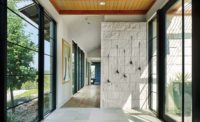
For nearly 80 years, Texas Quarries has been a reliable source of Texas limestone. With two quarries and a large-scale fabrication mill, the Cedar Park, TX-based operation has been producing Cordova and Lueders limestone since 1929. The company is owned by Acme Brick and is a subsidiary of Berkshire-Hathaway.
“Our Armadillo quarry is where we quarry Cordova Cream,” said Robert Copeland, production manager of Texas Quarries, who has been with the company for 23 years. “We quarry the ‘White Stone Lens’ on top of the Edwards Formation.”
Additionally, Cordova Shell Stone is extracted from the Armadillo site. “We pull off about 6 to 8 feet of [Cordova] Cream and then there is 4 feet of Shell [Stone] on the bottom,” said Copeland.
The quarry that produces Lueders limestone sits in the Abilene area of Texas. “Lueders is small scale compared to our Cordova Cream,” explained Copeland. He also explained that one ledge of the Lueders quarry produces a very unique material, which Texas Quarries calls Sea Trace limestone. The fossilization in this stone, which is a random crisscross pattern, was formed by a type of ancient worm called “Planolites” and a shrimp called “Thalassinoides.”
“It is very expensive, and it is very hard,” said Copeland. In one high-profile application, the material was incorporated into the design of the Student Union Building at Texas Tech in Lubbock, TX, which was designed by Holzman Moss Architecture of New York.

Fabricating the limestone
As with many businesses that have been in place for a number of years, Texas Quarries has experienced changes throughout the decades. When touring the mill today, it is apparent that high quality and efficiency are top priorities. Upgrades in equipment are responsible for increased production.Critical to the production process are three belt saws - one from Park Industries of St. Cloud, MN, and two from Standish Steel Inc. of Bedford, IN. “In 1993, we put in the belt saws and shut down five gangsaws,” said Copeland. “When it comes to limestone, [a belt saw] is the cat’s meow.”
The production manager went on to say that the belt saws will cut 15 to 16 inches per minute on an 8- or 9-foot block. “Our material is fairly soft, so we get a lot of life out of our diamonds,” he said. “We are in the process of automating the saws so we don’t have to have an operator, and we can run them all night.”
Another addition to the mill that has increased Texas Quarries’ productivity is a Park Industries Infinity® CNC machine, which is ideal for creating curved or straight stone profiles such as archways, coping, column caps and sills. “The Infinity is an excellent way to shape limestone,” said Copeland. In fact, after the CNC was first installed, workers tested it out by creating a limestone sign with the company’s name carved into it.
Additional equipment used in the limestone fabrication process include splitters from Park Industries and Cee-Jay Tool Co. and planers that are used for surface treatments. Various hand tools are also utilized for finishing work.
Texas Quarries is also environmentally conscious, and as a result, the company recycles its water with a man-made pond on its property. A filter press is used to take the solids out of the slurry, and then the water is reused in the mill.

Marketing its products
According to Copeland, Texas Quarries caters to both the residential and commercial markets. “We do mostly custom homes and high-end residential work. [Also], we specialize in universities,” he said.Copeland explained that the town of Cedar Park has experienced massive growth in recent years. “In the last 20 years, [the town] went from one high school and two elementary schools to four high schools and 20 elementary schools,” he said. “This is one of the fastest growing areas.”
Many of Texas Quarries’ 70 employees have been working for the company for many years. “In the old days, you either cut Cedar or you worked in the stone mill,” said Copeland.
Last year, the company fabricated 800,000 square feet of limestone products. And while this is a drop from previous years due to a slower market, Texas Quarries still remains busy. On average, there will be three to four major projects going on at one time, as well as 12 to 24 smaller jobs. At the time of Stone World’s visit, work was being done on a large limestone sign for the Liberty Hill Panthers high school football team, which captured the AAA Division II Football State Championship in 2007.
Some high-profile projects completed by the company include City Hall in Grapevine, TX; Opus Winery in Napa Valley, CA; F.W. Olin Building at Southwestern University in Georgetown, TX; and an MCI building in Richardson, TX.






